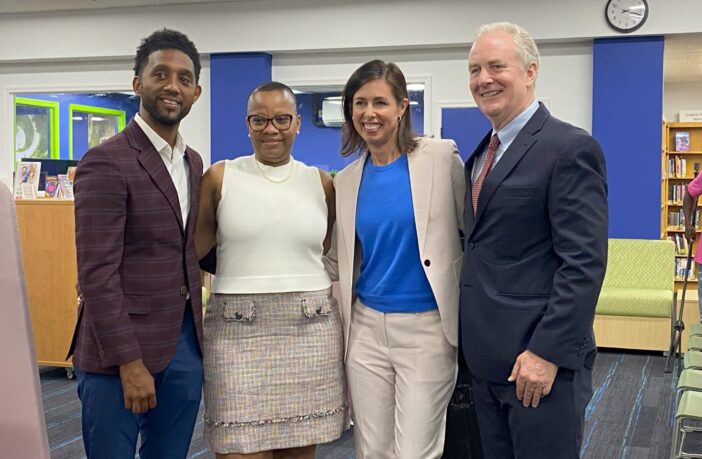By Tashi McQueen
AFRO Political Writer
tmcqueen@afro.com
U.S. Senator Chris Van Hollen (D-Md.), Baltimore City Mayor Brandon M. Scott (D) and Federal Communications Commission (FCC) Chairwoman Jessica Rosenworcel spoke on plans to expand internet connectivity in Baltimore on July 22.
Baltimore City Mayor Brandon M. Scott (D) (left); Darcell Graham, interim CEO of Enoch Pratt Free Library; Federal Communications Commission (FCC) Chairwoman Jessica Rosenworcel and U.S. Senator Chris Van Hollen (D-Md.) announce the expansion of internet access for Marylanders and Americans throughout the country. (AFRO Photo/Tashi McQueen)
“Last month when the emergency connectivity fund expired, we were faced with an impossible situation. We had to either turn off the data to those hotspots for over 2,000 families or find the hundreds of thousands of dollars to keep the program running,” said Darcell Graham, interim CEO of Enoch Pratt Free Library (EPFL), during a press conference at the EPFL Walbrook Branch in West Baltimore. “As a library, we knew we could not leave our families disconnected. We found the funding to keep them on, knowing that the program may not be financially sustainable for us in the future.”
The Enoch Pratt Free Library currently has about 2,000 hotspots in circulation. According to Meghan McCorkell, Enoch Pratt Free Library’s chief of marketing, communications and strategy, about 969 people are waiting for a hotspot.
The FCC voted on July 18 to allow schools and libraries to broaden the E-Rate Program, a federal program that makes internet access more affordable for libraries and schools throughout the U.S. The program specifically permits funds to be used to loan Wi-Fi hotspots to teachers and students so they can use the internet anywhere they go.
“I think all of us know that in this age, in the 21st century, having access to the internet is as important as it was to have access to electricity in the twentieth century,” said Van Hollen. “Workers need it to develop their skills, people need it to connect with healthcare providers, entrepreneurs need it to help start-up and sustain their small businesses and our students need the internet to learn.”
Scott emphasized the importance of “closing the digital divide.”
“Baltimore has lagged behind other jurisdictions when it comes to internet connectivity and access to the technology and devices that we need,” said Scott. “There isn’t a single silver bullet that is going to close the digital divide. It’s going to take every piece, internet access, education and training and access to devices. There needs to be a mosaic of strategies and programs to help close the gap in short and long-term goals.”
Rosenworcel elaborated on how many families will benefit from the expansion.
“It’s going to depend on the demand of an annual budget for e-rate. That’s roughly $4.9 billion,” said Rosenworcel. “We anticipate more than a billion dollars will be available specifically for hotspots, so it’s gonna make a meaningful difference in a lot of places across the country.”



